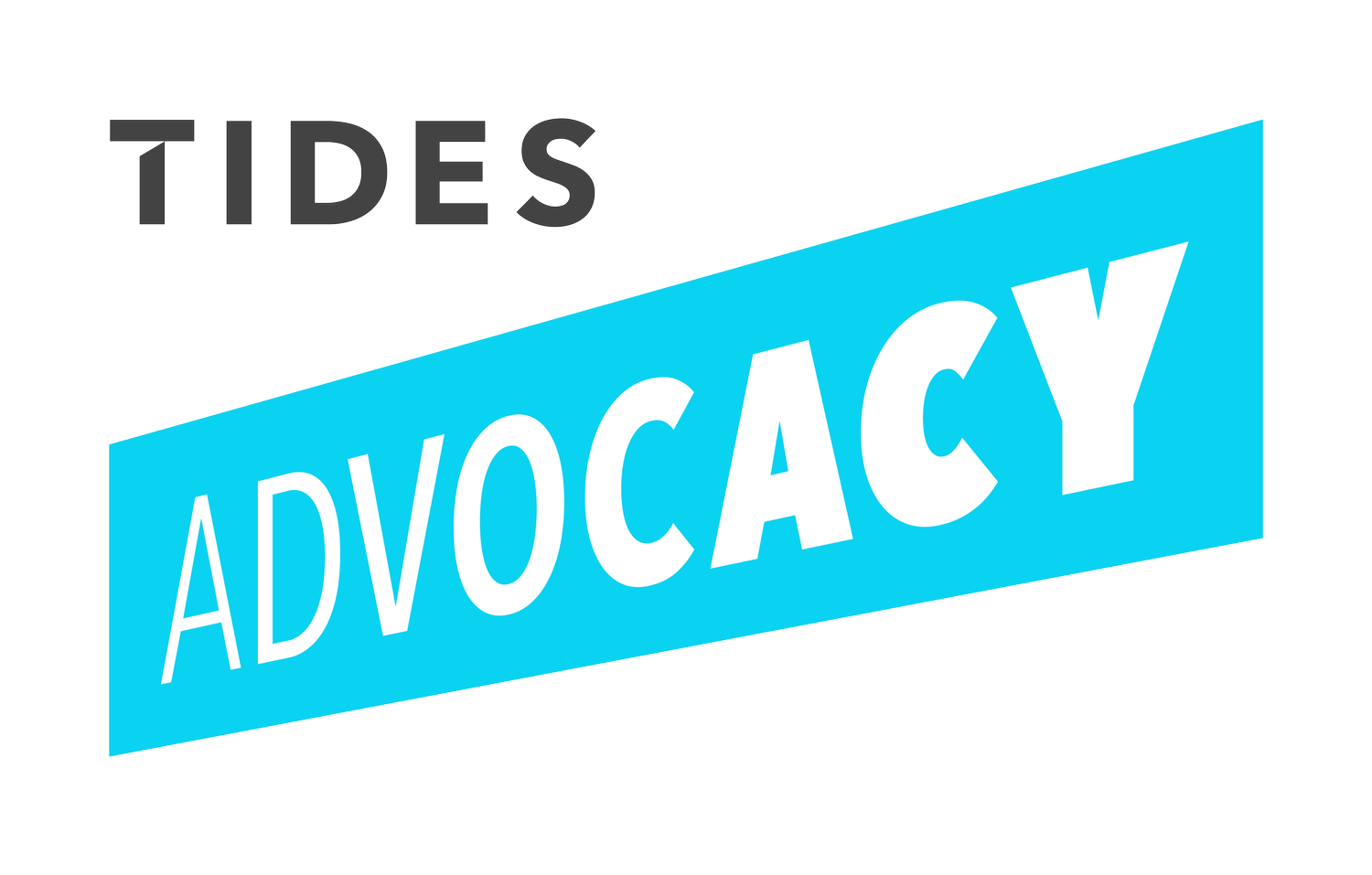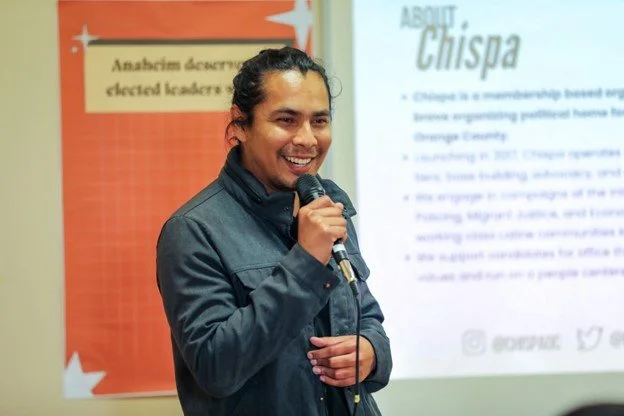Organizing Young Latino Power in The Real OC - Hairo Cortes of Chispa
We know that young people are the future and our conversation with Hairo Cortes, Founder and Executive Director of Chispa, only further emphasizes how important it is to center our organizing strategies around the leadership of young people. In this feature in our Black Love Rising series, Hairo talks about a different side of Orange County and the work he’s doing at his organization to create a political home for young Latinos and immigrant communities so they can get their voices heard and effect real change in a region that hasn’t always represented their interests. We are proud to support Chispa and invite you to learn more about their exciting vision.
Tell us about the vision of Chispa. What are some of the top priorities for your organization right now?
Hairo: We’re based out of Orange County, California, and generally when people think of Orange County, they think of beach cities and what’s been presented on TV for decades. But Orange County is more than that. It is more than affluence and the home of conservatism. We have one of the largest immigrant communities in the state, and one of largest Latino communities. We’re a very young community. Our median age is in the early 30s. When we were building Chispa, we wanted to build an organization that could become a political home for young Latinos seeking an organization to build community, organize around progressive issues, and flex their power politically. That’s been our grand vision.
We fell into priority issue areas organically. We work at the intersection of policing, migrant justice and economic justice - this is the intersection where our family and community lives. We have done a lot of police accountability work since we were founded and have become a leading organization that provides directions to other partners in the region. In 2022, we had a big victory and wrote and passed a police oversight ordinance in Santa Ana. This was first proposed in 1965 after the Watts riots. That was one of our biggest wins as an organization.
Tides Advocacy’s Black Love Rising campaign is about highlighting love for Black people, communities and our collective liberation. The spirit of "Black Love Rising" is to create an inclusive space that fosters understanding and cross-racial solidarity. Can you share examples or reflections on what cross-racial solidarity means to Chispa?
Hairo: The protests in 2020 following the murder of George Floyd touched every corner of the country and Orange County was not an exception. It was a moment of crystallizing the work we were already doing around policing. The areas we live in are heavily Latino but this was a moment of rising up and meeting what was happening, showing up for demands around police accountability and the basic workings of this country such as how we distribute our resources and the racial disparities.
As we do work statewide, we approach it from the idea that whatever we do, the outcome needs to have a collective benefit for everyone. My background is in immigrant rights campaigns. One of my criticisms of a lot of immigrant rights work and immigrant rights messaging is that it’s always been anti-Black. A lot of the messages have created a distinction between primarily Latino migrants and Black people in the U.S. The language has been “we’re not criminals,” when we know Black people have been heavily criminalized. When we say “we’re here to work” when we know there have been stereotypes pushed for decades and decades about work and Black people. So how do we take on work, message and organize in a way that we’re not reinforcing racist stereotypes and the policy outcomes don't have negative consequences for other communities?
Hairo Cortes, Founder and Executive Director of Chispa
Who or what motivates your commitment to organizing?
Hairo: I’ve always been a believer in organizing led by young people. At my previous organization, I was 22, 23 in youth organizing. When we were founding Chispa out of the need for multi-entity infrastructure, we were mostly doing c3 work, but we needed the flexibility to take positions during elections. I knew Chispa needed to be a space for young people. There are still not that many organizations that are led by young people. Usually they have a youth component or program - but it’s not the program. As our membership has been growing, it’s reaffirmed for me that we did the right thing building this thing out for the people we built it for. We have such amazing leaders and energy and that motivates me.
Are there any recent projects or campaigns from Chispa that exemplify what it means to lead with love for community and liberation?
Hairo: Historically, a lot of our work is from Santa Ana. A lot of our staff grew up here and membership is from there. We were one of few cities in 2010 that closed down an immigrant detention center, an early city that passed a sanctuary policy after Trump’s election, and our police oversight ordinance. When it comes to local municipal work, most of our work has been mostly focused in Santa Ana.
North of Santa Ana is Anaheim, home to the Angels stadium and Disneyland. Our membership in Anaheim has been growing in the last two years. When you have a city with Disneyland and a huge resort industry, you’re going to have some of the most powerful people. And then you walk from Disneyland and all the hotels to see people sleeping in their cars and deep poverty. Last year, the mayor, supported by resort industry and PACs, was indicted and charged with a litany of corruption charges. He essentially tried to sell Angel Stadium for a million dollars in campaign money. While this was happening, our staff was being asked by our members to do something and provide capacity to show up to city council meetings or protests. It was an immediate “yes” and “what do you need” from us.
We realized we’ve always had these aspirations to be a political home for young Latinos in the regions. We were following our members’ lead and they were pulling us towards Anaheim. There weren’t other young people showing up to council meetings before that. So from there, we’ve talked about what are the bigger issues and how we deepen our work in Anaheim. It culminated into a town hall with 60 young people to discuss the political apathy and lack of effort in the city. No one has been providing resources or infrastructure for them to organize amidst decades of political corruption. Now Anaheim is a really core part of our ongoing and future work. This all came from following the leadership of young people. We just published a blog post about this experience because it’s a really big and important moment.
Chispa members and staff attend their first City Council Meeting to support Campaign Finance Reform in the wake of the political corruption scandal
What do you wish more people understood about engaging and mobilizing young Latinx folks right now?
Hairo: You just have to invest in it. Young Latinos can be a major force in this country. They understand the issues. A lot of their formative life experiences was through this period of 2020 uprisings, COVID and everything the pandemic revealed. Young Latinos have to be part of conversations for building long-term progressive political power. Our organizations need to focus on creating spaces where we can convene, talk, come up with ideas, and take them into action. Our town hall in Anaheim, for example, was about providing space for the young people to talk about community and get support from us. That gave us direction and that’s what we all need.
What do you want funders to understand if they want to help invest in building Latinx political power?
Hairo: We’ve had a lot of victories in a short period of time. What I try to get funders to understand is that at the core of this, what has explained a lot of our victories and growth as an organization is Chispa’s multi-entity work. The funding landscape is difficult for any organization, particularly a regional one, and the funding landscape on the c4 side even more so. None of our issue victories would have happened without the explicitly political work we’ve done. We need to resource more multi-entity organizations, and resource more c4 work at the regional and local level. Most of the laws that are going to impact people are going to be the laws made down the street from them.
Wouldn’t it be cool if more local organizations had the tools, capacity and resources to engage in c4 work? They are already talking to leaders about laws that need to be created and changed and programs that need to be funded. What if more of us had the flexibility to engage our bases in politics. The reality is that we started seeing change in elected leadership and more boldness because nobody likes to do something without cover. For us at Chispa, to be able to serve as a counterweight to the more conservative political interests and actors in the areas we work, it helps us to do more. Invest in more ways of organizing than what you’re used to.
Support and follow Chispa at Chispaoc.org and on social media - Facebook, Twitter and Instagram. We also want to hear your thoughts! What does #BlackLoveRising mean to you? Share with us on our social media channels or send us an email.



